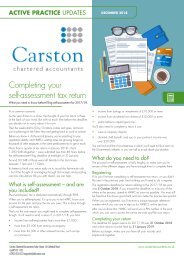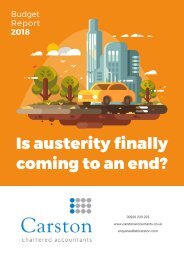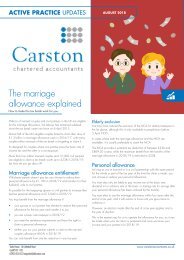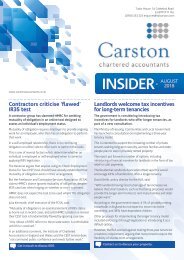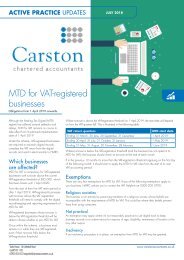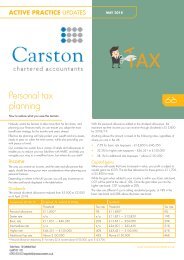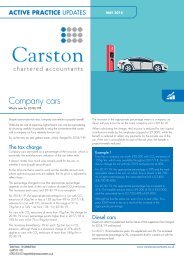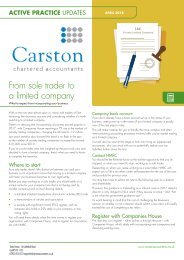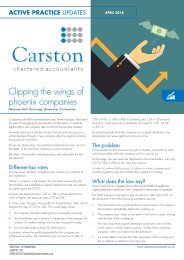Furnished Holiday Lettings
- No tags were found...
You also want an ePaper? Increase the reach of your titles
YUMPU automatically turns print PDFs into web optimized ePapers that Google loves.
<strong>Furnished</strong> holiday lettings<br />
However, the property may be let to one tenant for longer than 31<br />
days and still qualify, providing the total lettings that exceed 31 days<br />
do not amount to more than 155 days of the tax year.<br />
If the conditions are not met for a tax year, after taking into account<br />
the following average and grace period elections, the income is taxed<br />
as normal residential property income.<br />
Averaging<br />
If you let more than one property as a furnished holiday letting, you<br />
can average the days of short-term lettings across all your properties<br />
to determine whether the third condition (above) is met across your<br />
entire business.<br />
This averaging exercise can allow all your properties to qualify as<br />
furnished holiday lettings where some properties easily meet the<br />
105 days’ let condition and others do not.<br />
The periods of short-term lettings for properties in the UK can’t be<br />
averaged with periods of short-term letting of properties located<br />
abroad in determining this election.<br />
Grace period<br />
The threshold of 105 days of actual letting may not be achieved in<br />
some years, in which case you can use the ‘grace period’ election.<br />
This allows a property to qualify as a furnished holiday letting if it<br />
qualiied in the previous year.<br />
The property must be available for short-term letting for the full<br />
210 days in the year for this election to apply.<br />
You can make the grace period election for up to two consecutive years.<br />
Overseas properties<br />
Properties let in other EEA countries can qualify if the furnished holiday<br />
letting conditions are met.<br />
The EEA countries comprise all 28 member states of the EU plus<br />
Liechtenstein, Norway and Iceland.<br />
This extension of the furnished holiday letting rules to properties located<br />
in other EEA countries is likely to cease when the UK leaves the EU.<br />
Proits and losses arising from overseas properties must be calculated<br />
and reported separately from furnished holiday lettings in the UK.<br />
Capital gains tax reliefs<br />
Entrepreneurs’ relief<br />
Where all or a substantial part of your business is disposed of,<br />
entrepreneurs’ relief can apply if the conditions were met in the<br />
12 months prior to disposal.<br />
This relief will allow up to £10 million of gains to be taxed at 10%,<br />
rather than 18% or 28%.<br />
HMRC is unlikely to agree to a claim for entrepreneurs’ relief on the<br />
disposal of a single property out of a business that includes several<br />
furnished holiday letting properties.<br />
Rollover relief<br />
Properties used for furnished holiday lettings qualify as business assets<br />
for rollover relief.<br />
Where a gain arises on the disposal of a property, that gain can be<br />
rolled into the cost of a furnished holiday letting acquired in the<br />
four-year period which starts 12 months before the disposal.<br />
In this way, CGT is not payable on the gain until the replacement<br />
property is sold.<br />
Similarly, where a gain has arisen on the disposal of assets from a<br />
different business, the gain can be rolled into a property acquired for<br />
use as a furnished holiday letting.<br />
Holdover relief<br />
When you give valuable assets to a relative, other than your spouse or civil<br />
partner, CGT will be payable as if the asset had been sold at market value.<br />
However, the gain arising from business assets, including properties used as<br />
furnished holiday lettings, can be passed on to the new owner of the asset.<br />
Any CGT is then deferred until the new owner disposes of the<br />
property and is not payable at the time the property is gifted.<br />
Disadvantages<br />
VAT<br />
Letting of all holiday accommodation is standard-rated for VAT<br />
purposes, whether or not it qualiies as a furnished holiday letting.<br />
As such, where the landlord is VAT-registered, 20% VAT must be<br />
added to the fees charged.<br />
The landlord must register for VAT when the total value of fees charged<br />
for holiday lettings plus the value of other sales made exceeds<br />
£85,000 in any 12-month period.<br />
Care should be taken if the furnished holiday letting owner is also<br />
self-employed and making taxable supplies.<br />
In this case, turnover from the sole trade and the furnished holiday<br />
letting must be taken into account to determine whether the VAT<br />
threshold has been breached.<br />
Business rates<br />
Where a property in England is made available for letting on short-term<br />
lets for 140 days or more per year, it will be subject to business rates<br />
rather than council tax.<br />
For properties in Wales, the property must also be let for 70 days or<br />
more a year for business rates to apply.<br />
Different rules apply to properties in Scotland or Northern Ireland,<br />
where small business rates relief may be available.<br />
Planning restrictions<br />
The planning regulations vary across the country.<br />
In London, planning permission is needed if the property is let for<br />
short-term lets for 90 days or more in a calendar year.<br />
Where the property is held as leasehold, the lease agreement may<br />
prohibit short-term sub-letting.<br />
Private use<br />
Where a furnished holiday letting property is used by the landlord’s<br />
family for no charge, any capital allowances claimed in that tax year<br />
must be restricted for private use on a just and reasonable basis.<br />
This restriction should also logically be applied to the annual expenses<br />
for the property, such as local property taxes, power and water charges.<br />
If the property is within a company, a beneit in kind could arise which<br />
will need to be reported to HMRC under the P11D regime.<br />
Talk to us about your property portfolio.



